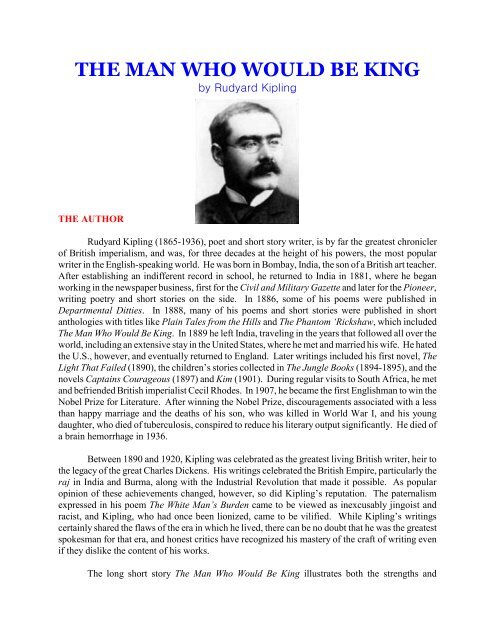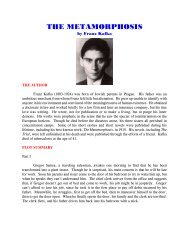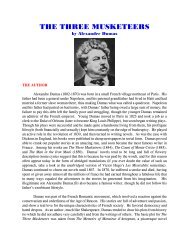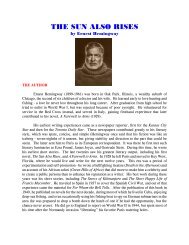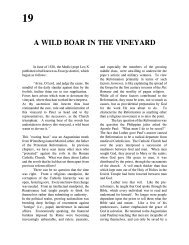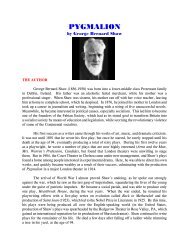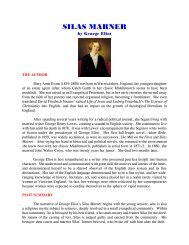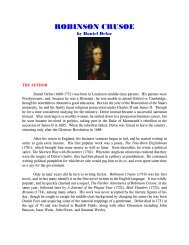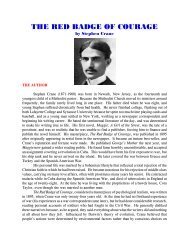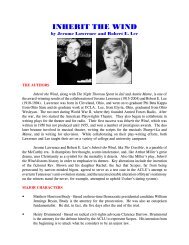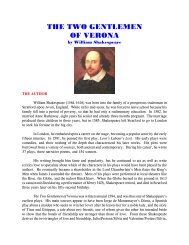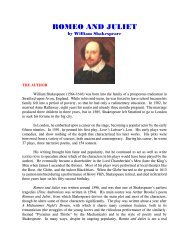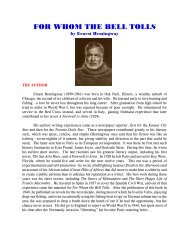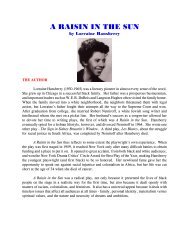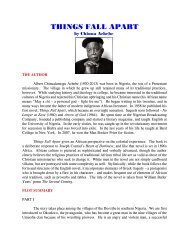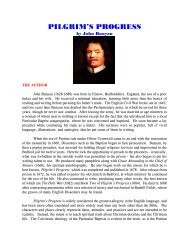THE MAN WHO WOULD BE KING
THE MAN WHO WOULD BE KING
THE MAN WHO WOULD BE KING
You also want an ePaper? Increase the reach of your titles
YUMPU automatically turns print PDFs into web optimized ePapers that Google loves.
<strong>THE</strong> <strong>MAN</strong> <strong>WHO</strong> <strong>WOULD</strong> <strong>BE</strong> <strong>KING</strong><br />
by Rudyard Kipling<br />
<strong>THE</strong> AUTHOR<br />
Rudyard Kipling (1865-1936), poet and short story writer, is by far the greatest chronicler<br />
of British imperialism, and was, for three decades at the height of his powers, the most popular<br />
writer in the English-speaking world. He was born in Bombay, India, the son of a British art teacher.<br />
After establishing an indifferent record in school, he returned to India in 1881, where he began<br />
working in the newspaper business, first for the Civil and Military Gazette and later for the Pioneer,<br />
writing poetry and short stories on the side. In 1886, some of his poems were published in<br />
Departmental Ditties. In 1888, many of his poems and short stories were published in short<br />
anthologies with titles like Plain Tales from the Hills and The Phantom ‘Rickshaw, which included<br />
The Man Who Would Be King. In 1889 he left India, traveling in the years that followed all over the<br />
world, including an extensive stay in the United States, where he met and married his wife. He hated<br />
the U.S., however, and eventually returned to England. Later writings included his first novel, The<br />
Light That Failed (1890), the children’s stories collected in The Jungle Books (1894-1895), and the<br />
novels Captains Courageous (1897) and Kim (1901). During regular visits to South Africa, he met<br />
and befriended British imperialist Cecil Rhodes. In 1907, he became the first Englishman to win the<br />
Nobel Prize for Literature. After winning the Nobel Prize, discouragements associated with a less<br />
than happy marriage and the deaths of his son, who was killed in World War I, and his young<br />
daughter, who died of tuberculosis, conspired to reduce his literary output significantly. He died of<br />
a brain hemorrhage in 1936.<br />
Between 1890 and 1920, Kipling was celebrated as the greatest living British writer, heir to<br />
the legacy of the great Charles Dickens. His writings celebrated the British Empire, particularly the<br />
raj in India and Burma, along with the Industrial Revolution that made it possible. As popular<br />
opinion of these achievements changed, however, so did Kipling’s reputation. The paternalism<br />
expressed in his poem The White Man’s Burden came to be viewed as inexcusably jingoist and<br />
racist, and Kipling, who had once been lionized, came to be vilified. While Kipling’s writings<br />
certainly shared the flaws of the era in which he lived, there can be no doubt that he was the greatest<br />
spokesman for that era, and honest critics have recognized his mastery of the craft of writing even<br />
if they dislike the content of his works.<br />
The long short story The Man Who Would Be King illustrates both the strengths and
weaknesses of British imperialism. The rascally vagabonds Peachey Carnehan and Daniel Dravot<br />
epitomize the adventurers who built the British Empire in its early years, while their hubris captures<br />
the folly of the Empire’s paternalistic attitudes. As one of the most self-critical of Kipling’s works,<br />
it continues to be beloved by those who seek to understand what drove the adventurers who created<br />
an empire on which the sun never set.<br />
PLOT SUMMARY<br />
The unnamed narrator of the story is a newspaperman in India, and thus a surrogate for<br />
Kipling himself. While traveling by rail, he meets a vagabond named Peachey Carnehan, who,<br />
discovering that he is a fellow Mason, asks him to deliver a message to his friend Daniel Dravot.<br />
The narrator delivers the message and thinks no more of the encounter, though he does report the<br />
two rascals to the authorities for fear that they should stir up some mischief. As a result of this<br />
report, the two men are turned back trying to cross the border. Shortly thereafter, Carnehan and<br />
Dravot show up at the narrator’s newspaper office in the middle of the night. Insisting that he owes<br />
them a favor after having turned them in, they talk him into letting them look at some maps and<br />
reference books stored in the office. He agrees, but is astounded to find out that they intend to<br />
journey to far-off Kafiristan (supposedly a remote section of Afghanistan), intending to conquer it<br />
and make themselves kings. They then sign a contract, witnessed by the narrator, in which they<br />
swear to abstain from liquor and women until their task is completed.<br />
A few weeks later, the narrator hears that Daniel and Peachey have succeeded in crossing the<br />
border by disguising themselves as a mad Muslim priest and his attendant. He assumes, at this point,<br />
that they will never survive their journey. Over two years pass, and the narrator again finds his office<br />
invaded, this time by a disfigured shell of a man. When he introduces himself as Peachey Carnehan,<br />
the narrator refuses to believe him at first. Peachey then tells the story of their adventures in<br />
Kafiristan.<br />
Daniel and Peachey did indeed succeed in making the journey to the far-off land of<br />
Kafiristan. They first journeyed by camel with a caravan, then obtained some mules from bandits<br />
who tried to rob them. Soon after they killed the mules for food, they encountered two tribal groups<br />
preparing for battle. Having prepared themselves with firearms, they joined the weaker party, easily<br />
defeating the larger contingent with their guns. The people thought Daniel and Peachey were gods,<br />
and they quickly gained control of the village, then expanded their rule to surrounding villages by<br />
drilling the men from their village and embarking on a series of conquests. A crucial point in the<br />
expansion of their empire occurs when they discover, carved on the bottom of a stone in one of the<br />
larger towns, a Masonic symbol that matches the one worn by Daniel. The people then become<br />
convinced that Daniel is the son of Alexander the Great, who supposedly had conquered the region<br />
many centuries before and had promised to return one day. Daniel, of course, agrees, and proceeds<br />
to establish an ad hoc Masonic lodge with himself as the Grand Master.<br />
For a time, all is well in the Empire of Daniel and Peachey. Peachey leads the army while<br />
Daniel dispenses justice, much more fairly than the people were accustomed to seeing. Daniel,<br />
convinced that he has found his destiny, determines to marry and start a hereditary monarchy.<br />
Peachey reminds him of their contract, and warns him that, after all, they are still among savages,<br />
and that he should not give in to overconfidence. Daniel will hear nothing of such caution, however,<br />
and chooses a bride for himself among the young women of his new capital. The girl is terrified,<br />
believing that any woman who sleeps with a god will be consumed by fire as a result of the intimate
contact. This makes it easy for the local priests, who had seen their power diminished by the coming<br />
of Daniel and Peachey, to convince her to test her new husband’s claim to deity. At the wedding<br />
ceremony, as they are about to kiss, she bites him instead. The bite draws blood, proving that Daniel<br />
is not a god after all. The villagers rise up against him, finally throwing him off a rope bridge into<br />
a deep ravine, where his body is shattered on the rocks. Peachey is captured and crucified; when he<br />
doesn’t die, the incredulous villagers release him. Having ended his tale, Peachey offers the narrator<br />
as proof the contents of a box he had carried with him from Kafiristan - the head of Daniel Dravot,<br />
still wearing its golden crown. A few days later, the narrator hears that Peachey has been placed in<br />
a local asylum, where he dies shortly thereafter.<br />
MAJOR CHARACTERS<br />
• Narrator - This unnamed character, a newspaper reporter, carries a message from Peachey<br />
Carnehan to his friend Daniel Dravot, receives a visit from them prior to their journey to<br />
Kafiristan, and later hears the whole story from the badly-mangled Peachey.<br />
• Peachey Carnehan - a British ne’er-do-well who, with his friend Daniel Dravot, is<br />
determined to make himself king of Kafiristan. When their short-lived empire collapses,<br />
Peachey is crucified, but he lives to return and tell the tale of their adventures to the narrator.<br />
• Daniel Dravot - Peachey’s companion in adventure, he becomes for a short time the king of<br />
Kafiristan, but is killed when a bite-wound administered by his wife on his wedding day<br />
convinces the natives that he is not a god after all, and they thrown him into a deep ravine.<br />
• Billy Fish - One of the Kafiri chieftains who becomes an early and faithful ally of Daniel and<br />
Peachey.<br />
NOTABLE QUOTATIONS<br />
“The Law, as quoted, lays down a fair conduct of life, and one not easy to follow. I have<br />
been fellow to a beggar again and again under circumstances which prevented either of us finding<br />
out whether the other was worthy. I have still to be brother to a Prince, though I once came near to<br />
kinship with what might have been a veritable King, and was promised the reversion of a Kingdom -<br />
army, law-courts, revenue, and policy all complete. But, to-day, I greatly fear that my King is dead,<br />
and if I want a crown I must go hunt for it myself.” (Narrator, p.244)<br />
“We are not little men, and there is nothing that we are afraid of except Drink, and we have<br />
signed a Contrack on that. Therefore, we are going away to be Kings.” (Peachey, p.252)<br />
forth.<br />
“This Contract between me and you persuing witnesseth in the name of God - Amen and so<br />
(One) That me and you will settle this matter together; i.e. to be Kings of Kafiristan.<br />
(Two) That you and me will not, while this matter is being settled, look at any
Liquor, nor any Woman black, white, or brown, so as to get mixed up with<br />
one or another harmful.<br />
(Three) That we conduct ourselves with Dignity and Discretion, and if one of us gets<br />
into trouble the other will stay by him.<br />
Signed by you and me this day.” (Daniel and Peachey’s “Contrack,” p.254)<br />
“I wasn’t any means comfortable, for I knew that dealings with a woman in foreign parts,<br />
though you was a crowned King twenty times over, could not but be risky.” (Peachey, p.272-273)<br />
“The mountains they danced at night, and the mountains they tried to fall on Peachey’s head,<br />
but Dan held up his hand, and Peachey came along bent double. He never let go of Dan’s hand, and<br />
he never let go of Dan’s head. They gave it to him as a present in the temple, to remind him not to<br />
come again, and though the crown was pure gold, and Peachey was starving, never would Peachey<br />
sell the same.” (Peachey, p.278)<br />
ESSAY QUESTIONS<br />
Discuss the following in a five-paragraph essay:<br />
1. To what extent is Rudyard Kipling’s The Man Who Would Be King an allegory of the British<br />
colonial experience Cite parallels between the story of the adventures of Peachey and<br />
Daniel and the entire British experience in India.<br />
2. In the years since his death, Rudyard Kipling has been vilified as an imperialist and racist.<br />
Do you believe these charges are justified Use details from The Man Who Would Be King<br />
to support your arguments.<br />
3. Rudyard Kipling’s The Man Who Would Be King is full of biblical imagery. Daniel on<br />
several occasions quotes verses from Scripture or alludes to biblical passages. Discuss the<br />
symbolic significance of the Scripture references in the story.<br />
4. Look up the words to the other verses of “The Son of God Goes Forth to War,” the hymn<br />
sung by a delirious Peachey at the end of Rudyard Kipling’s The Man Who Would Be King.<br />
Why is this hymn a fitting epilogue to the story Discuss the symbolic significance of the<br />
words of the hymn in relationship to the main themes of the narrative.<br />
5. In Rudyard Kipling’s The Man Who Would Be King, Daniel is pictured as a son of a god and<br />
Peachey is crucified. To what extent does Kipling intend these two rascals to be Christ<br />
figures What parallels is he seeking to make<br />
6. In Rudyard Kipling’s The Man Who Would Be King, the fact that the three main characters<br />
are Masons serves as a central plot device. What does Kipling intend to convey through this<br />
plot device What role does it play in driving the action<br />
7. Discuss the “Contrack” signed by Daniel and Peachey in Rudyard Kipling’s The Man Who
Would Be King. Was it a wise contract Did they keep it What role does it play in the<br />
development of the plot What does it reveal about the characters of the signatories<br />
8. Discuss the significance of Kafiristan, the name chosen for the fictitious country the<br />
protagonists try to conquer in Rudyard Kipling’s The Man Who Would Be King. What does<br />
the name mean How does it contribute to the key ideas the author sought to communicate<br />
in the story<br />
9. Rudyard Kipling’s The Man Who Would Be King utilizes the technique of embedded<br />
narration - a story within a story. What is the value of this literary technique in drawing the<br />
reader into the narrative and increasing its credibility How would the story have been less<br />
effective had it been narrated by Peachey, or from a third-person omniscient perspective<br />
10. The phrase “White Man’s Burden” is derived from the poetry of Rudyard Kipling. Though<br />
Kipling is often viewed as propounding jingoism of the worst variety, his short story The<br />
Man Who Would Be King has much in common with Conrad’s Heart of Darkness. Compare<br />
and contrast the critiques of colonialism found in the two works.<br />
11. Compare and contrast Rudyard Kipling’s The Man Who Would Be King and Joseph Conrad’s<br />
Heart of Darkness as symbolic critiques of European colonialism. Despite the differences<br />
between the Belgian Congo and the British raj, what elements do the two stories share<br />
12. Compare and contrast the roles of the narrators in Rudyard Kipling’s The Man Who Would<br />
Be King and Joseph Conrad’s Heart of Darkness. Do Kipling’s anonymous newspaper<br />
reporter and Conrad’s Marlow serve the same function in their respective stories In what<br />
key ways are they different<br />
13. Compare and contrast the narrative techniques used in Rudyard Kipling’s The Man Who<br />
Would Be King and Joseph Conrad’s Heart of Darkness. Both use embedded narratives, with<br />
the bulk of the story told in the first person by an eyewitness. How are the structures of the<br />
stories the same, and how are they different Which technique do you consider more<br />
effective Why Defend your answers with specifics from the two stories.<br />
14. Compare and contrast the book and movie versions of Rudyard Kipling’s The Man Who<br />
Would Be King. To what extent is the movie faithful to the book Does it deviate from<br />
Kipling’s short story in any significant ways Which do you think does a better job of<br />
communicating the story, along with its major themes Why<br />
15. Compare and contrast the narrative structures of the book and movie versions of Rudyard<br />
Kipling’s The Man Who Would Be King. Does the choice to use Kipling himself as the<br />
narrator of the movie affect the impact of the story in any way (notice how much Christopher<br />
Plummer looks like the picture of Kipling at the top of this file) If so, how If not, why<br />
not<br />
16. Consider the scene in the movie version of Rudyard Kipling’s The Man Who Would Be King
in which Daniel sits as a judge resolving the people’s disputes - a scene that is not found in<br />
the book. Is he a wise judge of the people Does the analogy to Solomon tell you anything<br />
about Daniel’s growth as a person through his experience<br />
17. Choose three scenes from the movie version of Rudyard Kipling’s The Man Who Would Be<br />
King that are not found in the book, and discuss how they amplify the major themes of the<br />
story. Would you agree that the scriptwriter out-Kiplings Kipling Why or why not<br />
18. Discuss the view of power and its effect on one who exercises it in Rudyard Kipling’s The<br />
Man Who Would Be King. Compare and contrast the ways this idea is illustrated in the book<br />
and in the movie.<br />
19. Discuss the portrayals of the major characters in Rudyard Kipling’s The Man Who Would Be<br />
King in the book and in the movie. Did the movie portray the characters as you envisioned<br />
them when you read the book If you saw the movie first, did you find that the portrayals<br />
in the book corresponded to the characterizations formed in your mind by the movie<br />
20. The effectiveness of a “buddy movie” like the film version of Rudyard Kipling’s The Man<br />
Who Would Be King often depends on the interactions of the main characters. Sean Connery<br />
and Michael Caine, who played Daniel and Peachey, were longtime friends before they did<br />
the movie together. Discuss the extent to which their friendship is visible in the banter that<br />
occurs throughout the film. Does the book portray the friendship of the two men as<br />
effectively as the movie Why or why not<br />
21. Discuss the changes that occur in the characters of the protagonists over the course of<br />
Rudyard Kipling’s The Man Who Would Be King. Do they change for the better or for the<br />
worse In what ways What are these changes intended by the author to communicate<br />
Which medium portrays these changes more effectively, print or film<br />
22. Compare and contrast the status attained by the protagonist in Joseph Conrad’s Lord Jim and<br />
that of Daniel in Rudyard Kipling’s The Man Who Would Be King. Consider how that status<br />
is attained, the qualities ascribed to the Englishmen by the natives, the ways in which the<br />
men use their status, and the ultimate ends of their reigns. Use those comparisons and<br />
contrasts to discuss the themes advanced by the authors of the two works.<br />
23. Compare and contrast William Golding’s Lord of the Flies and Rudyard Kipling’s The Man<br />
Who Would Be King as critiques of British imperialism. Which novel is more effective in<br />
its criticism Why Support your assessment with specifics from both stories.<br />
24. Compare Rudyard Kipling’s Kim and The Man Who Would Be King as critiques of British<br />
imperialism in India. Though the differences, whether in plot, characterization, or style,<br />
seem miles apart, do the two works have any similarities in their view of the British raj If<br />
so, what are they
25. Compare and contrast the pictures of friendship found in Rudyard Kipling’s Kim and The<br />
Man Who Would Be King. Consider especially the idea of love as sacrifice for a friend as<br />
you examine the relationships of Kim and the Lama on the one hand and Daniel and Peachey<br />
on the other.<br />
26. Compare and contrast the role of women in Rudyard Kipling’s Kim and The Man Who Would<br />
Be King. In the first, women are seen as distractions from the personal quests of the central<br />
characters, while in the latter the two ne’er-do-well adventurers swear off the company of<br />
women as they begin their quest and are brought to disaster when they violate their oath.<br />
What do these treatments tell the reader about the author’s attitude toward women May one<br />
draw general conclusions on the subject, or should one simply affirm that the author was<br />
trying to write engaging adventure stories under the assumption that most of his readers<br />
would be male


